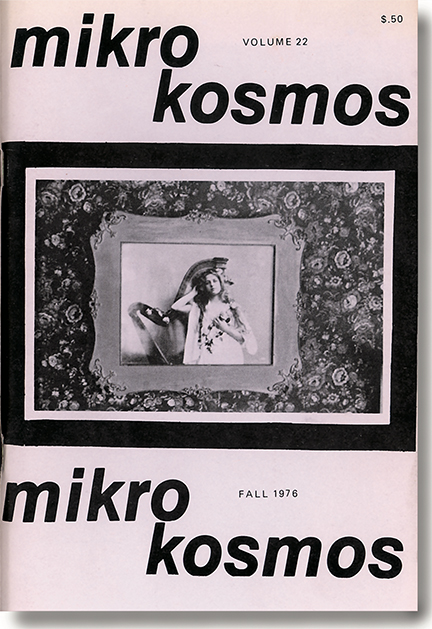
Mikrokosmos (the cover of the 1976 issue
is pictured here) has reflected the changing
times and featured the works of scores of
WSU-educated writers and artists, including
painter Denita Benyshek ’79, poets Mark
Shoup ’78/85/86 and Michael Cissell ’97/00,
novelist Janet Peery ’75/92 and non-fiction
writer Don Schawang ’90/92.
American literature endured a sea change in the 1950s, as old forms in poetry and prose were challenged by the exciting, confessional works of the writers who would come to be known as the Beats.
The entrenched bards of academia were for the most part unimpressed, and students eager to participate in the new literary wave were generally left to their own devices.
According to the late Lee Streiff ’55, “In 1952, the writers club at the University of Wichita was an appropriately dilettantish, sanctioned and ‘safe’ organization that produced a yearly magazine of unquestioning fare that threatened no one. The magazine’s name, Carrousel, was apt: childish, colorful, and blandly entertaining.”
Mikrocosmos has been published each year (and occasionally twice annually) since 1958 under the advisement of the Creative Writing Committee, Department of English. Traditionally, funding is provided by the Student Government Association.
Streiff, Michael McClure fs ’53, Bruce Conner fs ’55, David Haselwood ’53 and others attempted to take over WU’s Quill Club and publish a more daring magazine, but infighting and resistance from the university quashed the project — although they did succeed in taking over the club by maneuvering to become officers.
One of their first actions was renaming the organization the Writers Club.
Though previous efforts had failed, Corban LePell ’57/59, a student in WU’s art department, took another stab at creating such a publication. “I was very young and thought I could do anything.
That’s what happens when you’re young and a little arrogant,” LePell says, laughing, “or should I say, confident? Let’s just do a literary magazine. We’ve got some good folks around here.” He compiled poems, short stories and images from several fellow students, and the first issue of Mikrokosmos was published in 1958.
“I actually took the title from a series of piano works by Bela Bartok,” he says. “Mikrokosmos, meaning ‘little world.’ Poets are generally not world famous. They are part of a little world, and I thought it was appropriate.”
Today, that “little world” continues to be spotlighted in the pages of Mikrokosmos. But it almost ceased to be last year, as the journal ran into a dearth of funds. When Barb Kopecek ’99 (who writes fiction as Barbara Stewart) heard the bad news, she knew she had to do something to help.
She and her husband David, who jointly run Linesight Inc. (an internet-based business services company), had originally been lured to Wichita by Mikrokosmos. The Kopeceks hosted a fundraising auction, contributing substantially toward the printing costs for the upcoming issue.
April Pameticky, an MFA candidate in fiction and current Mikrokosmos managing editor, was similarly drawn in by the quality of the work that appears regularly in the magazine. “I actually was sent Mikro when I applied for graduate school,” Pameticky says, “and I really liked the appearance of the magazine. It looked good, it had great material. I said, ‘If that’s what the grad program is producing — if those are the types of writers coming out of WSU — then that’s where I want to be.’”
LePell is modest when asked if he ever imagined that Mikrokosmos would still be influential a half-century down the line. “No, I had no idea!” he says. “I thought it was a worthwhile thing to do. And I suppose given the chance, I’d do it again. But I’m terribly pleased it’s still going on. I’m quite flattered about that.”





